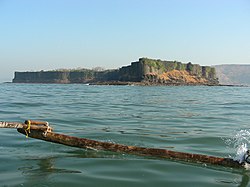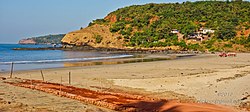Ratnagiri district
 From Wikipedia - Reading time: 11 min
From Wikipedia - Reading time: 11 min
This article needs additional citations for verification. (January 2016) |
Ratnagiri district | |
|---|---|
View of Suvarnadurg Fort from the sea, hills near Chiplun, Marleshwar Waterfalls, Velneshwar beach near Ratnagiri, Ganesha temple at Ganpatipule | |
 Location in Maharashtra | |
| Country | |
| State | |
| Division | Konkan |
| Headquarters | Ratnagiri |
| Tehsils | 1. Mandangad, 2. Dapoli, 3. Khed, 4. Chiplun, 5. Guhagar, 6. Sangameshwar, 7. Ratnagiri, 8. Lanja, 9. Rajapur |
| Government | |
| • Body | Ratnagiri Zilla Parishad |
| • Guardian Minister | Shri Uday Samant (Cabinet Minister MH) |
| • President Z. P. Ratnagiri | NA |
| • District Collector | M Devender Singh (IAS) |
| • CEO Z. P. Ratnagiri | Kirti Kiran Pujar (IAS) |
| • MPs | Shri Narayan Rane (Ratnagiri–Sindhudurg) Shri Sunil Tatkare(Raigad) |
| Area | |
• Total | 8,208 km2 (3,169 sq mi) |
| Population (2011) | |
• Total | 1,615,069 |
| • Density | 200/km2 (510/sq mi) |
| Demographics | |
| • Literacy | 82.18% |
| Time zone | UTC+05:30 (IST) |
| Major highways | NH-66, NH-204 |
| Website | ratnagiri |
Ratnagiri district (Marathi pronunciation: [ɾət̪n̪aːɡiɾiː]) is a district in the state of Maharashtra, India.[1] The administrative headquarter of the district is located in the town of Ratnagiri.[1] The district is 11.34% urban.[2] The district is bounded by the Arabian Sea to the west, Sindhudurg district to the south, Raigad district to the north and Satara, Sangli and Kolhapur districts to the east.[1] This district is part of Konkan division.[1]
History
[edit]From pre-Christian times until 1312, the area – like the entire region – was ruled by various Buddhist and Hindu rulers. The first state known by name was the Mauryan Empire, the last non-Muslim dynasty was the Yadavas of Devagiri. After decades of military clashes with Muslim rulers in northern India, the region was occupied by Muslim armies between 1312 and 1470. From 1500 on there was fierce fighting for rule on the coast between the Muslim rulers and the Portuguese. After that, various Muslim dynasties ruled until 1658 (Sultanate of Delhi, Bahmani, Deccan Sultanates and the Mughals). From 1658, most of the area became part of the Maratha Empire. After the defeat of the Marathas against the British in 1818, Ratnagiri area became an administrative region of the Bombay Presidency. With the independence of India in 1947 and the reorganization of the country, it became part of the new Bombay State in 1950. In 1948 the district grew through the incorporation of the Sawantwadi princely state. In 1960, Bombay State was divided and the area became part of the newly created state of Maharashtra. In 1981 the district was divided and the southern part of the district became Sindhudurg district.[3][4][5]
Geography
[edit]An outstanding feature of the geography of the district is its uneven or hill landscape ,with about 45% of the area covered by hills.The Sahyadri hill range runs for 180km.
Administrative divisions
[edit]Talukas
[edit]Nagar palikas
[edit]Nagar panchayats
[edit]Proposed nagar palika
[edit]Proposed nagar panchayats
[edit]Cities, towns and villages
[edit]- Brahmanwad
- Chiplun
- Dapoli
- Devrukh
- Guhagar
- Jalgaon
- Khed
- Kondgaon
- Kule
- Kumbhave
- Lanja
- Mandangad
- Rajapur
- Ratnagiri
- Satawali
- Umberghar
- Waghivane
Demographics
[edit]| Year | Pop. | ±% p.a. |
|---|---|---|
| 1901 | 871,866 | — |
| 1911 | 893,944 | +0.25% |
| 1921 | 856,032 | −0.43% |
| 1931 | 964,558 | +1.20% |
| 1941 | 1,022,816 | +0.59% |
| 1951 | 1,076,080 | +0.51% |
| 1961 | 1,146,243 | +0.63% |
| 1971 | 1,278,742 | +1.10% |
| 1981 | 1,379,655 | +0.76% |
| 1991 | 1,544,057 | +1.13% |
| 2001 | 1,696,777 | +0.95% |
| 2011 | 1,615,069 | −0.49% |
| source:[6] | ||
According to the 2011 census Ratnagiri district has a population of 1,615,069,[8] roughly equal to the nation of Guinea-Bissau[9] or the US state of Idaho.[10] This gives it a ranking of 311th in India (out of a total of 640).[8] The district has a population density of 196 inhabitants per square kilometre (510/sq mi) .[8] Its population growth rate over the decade 2001-2011 was -4.96%.[8] Ratnagiri has a sex ratio of 1123 females for every 1000 males,[8] and a literacy rate of 82.43%. 16.33% of the population lives in urban areas. Scheduled Castes and Scheduled Tribes make up 4.15% and 1.26% of the population respectively.[8]
At the time of the 2011 Census of India, 88.18% of the population in the district spoke Marathi, 7.36% Urdu, 1.43% Hindi and 1.14% Konkani as their first language. Most people speak distinct coastal dialects of Marathi.[11]
Notable people
[edit]Notable people from Ratnagiri include:
- Lokmanya Tilak
- B. R. Ambedkar
- Balasaheb Kher
- Dhondo Keshav Karve
- Vinoba Bhave
- Swatantryaveer Savarkar was moved to Ratnagiri with his freedom of movement restricted to the boundary of the district and also refraining from politics.[12]
- Govind Sakharam Sardesai
- R. P. Paranjpye
- Shakuntala Paranjpye
- Gopal Krishna Gokhale
- Rani Lakshmi Bai
Current officers and public representatives
[edit]Members of Parliament
[edit]| Member of Parliament | Political party | Lok Sabha constituency |
|---|---|---|
| Sunil Tatkare | Nationalist Congress Party | Raigad |
| Narayan Rane | Bharatiya Janata Party | Ratnagiri–Sindhudurg |
Members of Legislative Assembly
[edit]| Assembly constituency | Members of Legislative Assembly | Party | |
|---|---|---|---|
| Dapoli | Yogesh Kadam | Shiv Sena | |
| Guhagar | Bhaskar Jadhav | SS(UBT) | |
| Chiplun | Shekhar Nikam | NCP | |
| Ratnagiri | Uday Samant | SHS | |
| Rajapur | Kiran Samant | Shiv Sena | |
Guardian Minister
[edit]| Guardian Minister Ratnagiri | |
|---|---|
| पालकमंत्री रत्नागिरी | |
 Emblem of India | |
since 24 September 2022 | |
| Style | The Honourable |
| Residence | Ratnagiri |
| Appointer | Chief Minister of Maharashtra |
| Term length | 5 years / No time limit |
| Website | ratnagiri |
List of Guardian Ministers
[edit]| Name | Term of office |
|---|---|
| Ravindra Waikar | 31 October 2014 - 8 November 2019 |
| Anil Parab | 9 January 2020 - 29 June 2022 |
| Uday Samant | 24 September 2022- Incumbent |
District Magistrate/Collector
[edit]| District Magistrate / Collector Ratnagiri | |
|---|---|
| जिल्हाधिकारी तथा जिल्हदंडाधिकरी रत्नागिरी | |
 Emblem of India | |
Incumbent since 2019Mr. Dr. B. N. Patil (IAS) | |
| Residence | At Ratnagiri district |
| Appointer | Government of Maharashtra |
| Term length | No time limit |
| Website | ratnagiri |
List of District Magistrate / Collector
[edit]| Name | Term of office |
|---|---|
| Mr. Dr. B. N. Patil (IAS) | 2019 – Incumbent |
Geographical indication
[edit]Sindhudurg and Ratnagiri Kokum was awarded the Geographical Indication (GI) status tag from the Geographical Indications Registry, under the Union Government of India, on 31 March 2016.[13]
Sindhudurg Ratnagiri Mahakokum Sanstha from Malvan, proposed the GI registration of Sindhudurg & Ratnagiri Kokum. After filing the application in March 2014, the Kokum was granted the GI tag in 2016 by the Geographical Indication Registry in Chennai, making the name "Sindhudurg & Ratnagiri Kokum" exclusive to the Kokum grown in the region. It thus became the first Kokum variety from India and the 13th type of goods from Maharashtra to earn the GI tag.[14][15]
The prestigious GI tag, awarded by the GI registry, certifies that a product possesses distinct qualities, adheres to traditional production methods, and has earned a reputation rooted in its geographical origin.
See also
[edit]References
[edit]- ^ a b c d District Census Handbook Ratnagiri Village and Town Directory (Part A). Directorate of Census Operations. 2011. Retrieved 12 March 2021.
- ^ Census GIS India Archived 11 January 2010 at the Wayback Machine
- ^ Greater Bombay District Gazetteer 1986, "Ancient Period"
- ^ Greater Bombay District Gazetteer 1986, "Medieval Period"
- ^ Greater Bombay District Gazetteer 1986, "Muhammedan Period"
- ^ Decadal Variation In Population Since 1901
- ^ "Table C-01 Population by Religion: Maharashtra". censusindia.gov.in. Registrar General and Census Commissioner of India. 2011.
- ^ a b c d e f "District Census Hand Book – Ratnagiri" (PDF). Census of India. Registrar General and Census Commissioner of India.
- ^ US Directorate of Intelligence. "Country Comparison:Population". Archived from the original on 13 June 2007. Retrieved 1 October 2011.
Guinea-Bissau 1,596,677 July 2011 est.
- ^ "2010 Resident Population Data". U. S. Census Bureau. Retrieved 30 September 2011.
Idaho 1,567,582
- ^ a b "Table C-16 Population by Mother Tongue: Maharashtra". censusindia.gov.in. Registrar General and Census Commissioner of India.
- ^ Joglekar, Jaywant (2006). Veer Savarkar Father of Hindu Nationalism. p. 106. ISBN 978-1-84728-380-1. Retrieved 13 October 2014.
- ^ "Seven agriculture products get GI tag". The Times of India. 4 June 2016. Retrieved 8 February 2025.
- ^ "Geographical Indications". Intellectual Property India. Retrieved 9 February 2025.
- ^ Bhattacharya, Niharika Sahoo (13 September 2022). Geographical Indication Protection in India: The Evolving Paradigm. Springer Nature. ISBN 978-981-19-4296-9. Retrieved 8 February 2025.
Sources
[edit]- Greater Bombay District Gazetteer. Vol. 1 (E-book ed.). Government of Mahareshtra. 1986. Archived from the original on 27 February 2008. Retrieved 4 June 2023.
{{cite book}}: CS1 maint: bot: original URL status unknown (link)
 KSF
KSF




